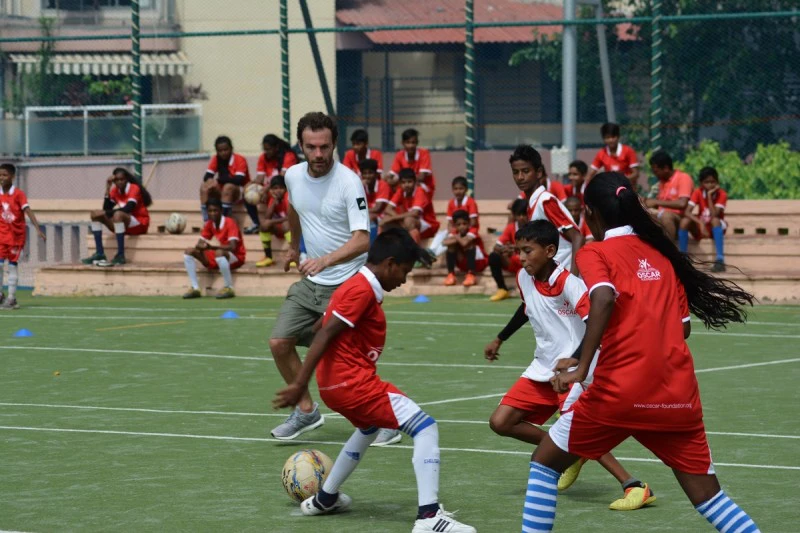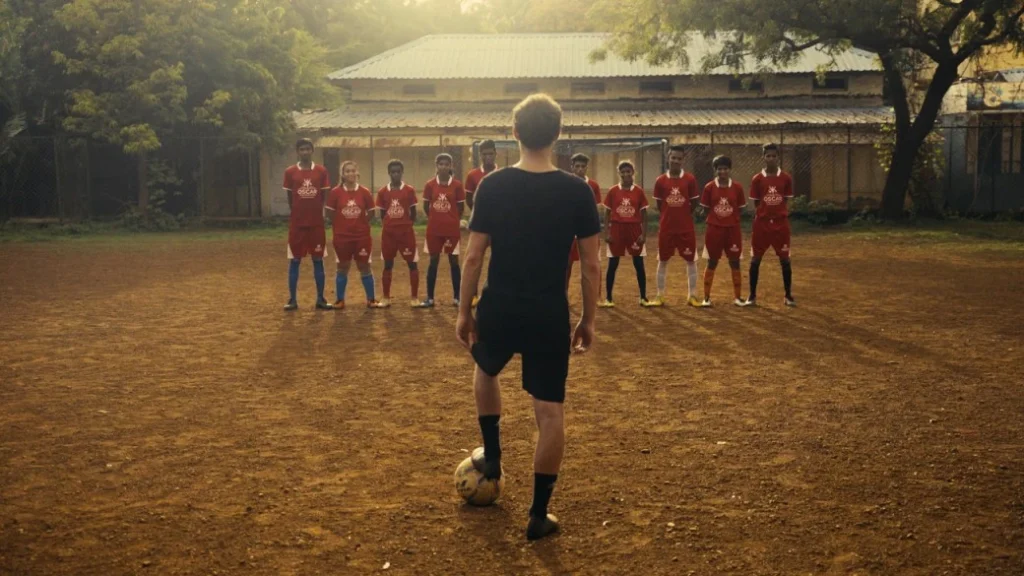The 2nd of July 1994, six days after scoring an own goal that left Colombia outside of the United States World Cup, the footballer Andrés Escobar was murdered. “Life doesn’t end here” were his last words before facing death. This not only provoked a world revolution but also persuaded one of our interviewees for today, Jürgen Griesbeck, to take action and contribute to create a better society through football.
In 1996, he created the association “Fútbol por la Paz”, which organized mixed football tournaments for Colombian underprivileged young people, persuading them to play football and learn how to solve problems in a peaceful way at a time where there were over 5000 dead young people per year just in the city. The project was such a success that in 2002, Jürgen decided to launch streetfootballworld, which currently contributes to improve the society through football in more than 80 countries.
However, his story did not end there. On August 4th, 2017, Jürgen Griesbeck, along with our second interviewee, the Manchester United footballer and World Cup Champion Juan Mata, launched the «Common Goal» initiative, a project that aims for players and companies to donate 1% of their income to improve society anywhere in the world through football. In just one year, Common Goal has become a reality and inspires people’s imagination, managing to engage world-class footballers such as Giorgio Chiellini or Mats Hummels, industry leaders such as UEFA President Aleksander Čeferin or our own project, World Football Summit.
Moreover, Jürgen Griesbeck has been a part of WFS since its inception, speaking in the last two editions and currently being part of the WFS Advisory Board. Juan Mata on the other hand has just confirmed his participation as a speaker in the third edition of WFS that will be held in Madrid on the 24th & 25th of September.
Jürgen and Juan, we are so proud of having you in our section “Digital Industry Talks”. First of all, we would like to ask you: Why did you decide to create Common Goal?
Jürgen: Since 2002, we had developed quite a solid network of organizations that were using football as a tool to change the realities in their respective communities. Over 120 organizations in more than 80 countries working with 2.5 million young people per year. We know what football is capable of, we now know how quality implementation looks like, we share values and had aligned behind a shared vision. Quite remarkable, taking into account that the NGO sector is educated to compete for funds and attention. We felt the time was ripe to build a bridge between the two worlds of football, the world where football generates financial resources and the world were football was saving lives.
Juan: I personally felt that it was the right moment for me to give back. I was thinking about creating my own foundation, as many other players do, but after meeting Jürgen and knowing what streetfootballworld had been doing for more than 15 years in the football for good area, I felt that collaborating with Jürgen and his amazing team, could be more effective and have more impact in many people’s lives. The idea of Common Goal movement is born with the “team play” concept, as by working together we will go further. It’s something that has never been done before in the football world and I personally believe that it was needed, and it’s fair. We created Common Goal to create a more balanced world thanks to football.

Both: At the beginning, both of you wanted eleven football players to represent the project but you didn’t get any of them. So, Juan decided to start alone. Did you ever think about abandoning the project? How many people told you that this was not a realistic project and that you wouldn’t get anything at all?
Jürgen: It’s true, the ambition was to have a Starting XI, a team to represent the collective nature of Common Goal. But we were unable, everybody we spoke to told us that this was impossible to achieve. Juan was convinced and courageous enough to go live anyway and, by doing so, make the information accessible to everybody beyond the traditional gatekeepers.
Juan: Someone always has to take the first step and I did it, obviously with the support and courage of Jürgen.
Jürgen, in the Paper made by World Football Summit about the Future of the Football Industry, you said that the importance of football in social terms is going to increase by 2020. Who do you think are going to be the key stakeholders that will provide this growth? And which factors are going to contribute to this growth?
Football has somehow managed to develop untouched by factors that in other industries generate change to avoid to be left behind. The passion and loyalty of the fans have tolerated quite alienating developments in the past years, While there might still be lots of space for economic growth, mainly thanks to technology, the gap within the industry and between the industry and the fans is only increasing. To stay relevant for people will not be solved by ever better entertainment, football needs to unlock its potential to be true and to do good.
Giorgio Chiellini, Mats Hummels, Álex Morgan, now the football club FC Nordsjaelland … Common Goal is more than just names of footballers. How do you convince these world-class players and clubs to join Common Goal?
Jürgen: The exercise is not convincing anybody, but inviting to be a driver of change in the life of people through what you love, football. It’s basically very easy, with very little of everybody football can unlock its potential to be an enabler for massive change and, along the way, the industry reconnects to the people, players are not anymore machines that need to produce results, but they are human beings again.
Juan: As Jürgen says, we are football players, but before we are human beings. Common Goal gives you the opportunity to have a deeper feeling of what being a football player is.
Common Goal is not only aimed at football players, you also work with an event like ours, where World Football Summit donates 1% of our income and provides a platform to showcase what you are doing as an organisation. How do you envision the role of the football industry as a whole in growing the Common Goal family?
Jürgen: again, Common Goal wants to create a new normal, where all the resources that are generated thanks to football invest 1% in a collective fund that maximizes the impact football can have to change people’s realities for the better, even contribute significantly towards achieving the UN Global Goals. It’s really not complicated.
Juan: It is a movement that obviously welcomes everyone, not only football players. It is also a very easy process to join. Everyone can find more information at www.common-goal.org

Juan, in an interview with El País, you assured that “there are cases in which soccer players are able to see the bubble in which they live and others do not, but the best thing would be to act globally with the help of leagues or institutions”. Do you believe that, slowly but surely, Common Goal is reaching this target by incorporating to the project people such as the UEFA President Aleksander Čeferin? How can these institutions be persuaded to help projects like Common Goal?
Juan: Yes. I believe that we are making great progress on that aspect, and undoubtedly, the presence of Alexander Čeferin in the movement has helped massively to do so. As Jürgen stated, the idea is to create an exercise of global reflection on what football can bring to society, and how football can help many people. All these institutions had been doing social programs for many years, which is great. With Common Goal we want to make that 1% rule a norm within professional football, so besides all of the fantastic work that many institutions are doing and will keep doing, the movement can perfectly coexist with them. Again, this is not about joining or not joining Common Goal, and not about convincing or persuading. It is about creating a platform that could change our sport and build a bridge between football as a sport and football as a social tool for change.
Jürgen, you wrote in an article in The Huffington Post that “the industry has to change its way of thinking and develop an attitude of real responsibility by embracing the social dimension of the game” Do you think that this attitude has changed in the past five years? If it has, what factors have contributed to this change?
Yes, I do think so. There are more and more examples of Clubs, players, businesses, confederations, National Teams, etc. who care and give back. That’s awesome. Common Goal is set up to support, amplify and make it a standard, and Common Goal is a collective effort that acts on behalf of football and beyond individuals and brands. One illness of all the positive initiatives is that most of them don’t collaborate, there is little learning from one another and lot of duplication and reinventing the wheel.
You also assured in an Interview with Sky Sports that: “Clubs and agents want football players to focus on just playing football because this is the immediate value they get out of the players” How do initiatives like Common Goal struggle with it?
In general, we believe that people with a purpose in live that goes beyond producing results are happier people, and happier people produce better results. Why should this not apply to footballers. The struggle is that footballers often do feel that, but the protecting system around them many times don’t allow it to flourish.
Juan, Related to this question, how could clubs do more to involve their players in social initiatives?
There has been a great improvement in this aspect over the years, thanks to football club’s Foundations and several social campaigns. It is true that giving more information to the players about what football represents today in society, and how we can, with little effort and time, help and inspire many people to improve their lives, would be useful in order to involve players in even more initiatives. What FC Nordsjælland is doing through their academy is a fantastic example of how a club can help kids to became great football players but also human beings with social responsibility.
Jürgen, How do you convince world-class players that rather than an own initiative, joining Common Goal and contributing to society is positive for society as a whole?
Jürgen: It’s not necessarily an either or. Again, Common Goal aspires to make the 1% a standard throughout the industry. If you believe that this would be a good thing, then you should join and help us achieve this goal, independently of what you as an individual, Club, business, etc. are doing already.
Juan declared that football is the biggest force of union that exists along with music but Jürgen, which values should football focus more to improve society? How can football help to engage with social causes like Common Goal?
Common Goal is not a typical social cause. Common Goal is a movement that wants to drive industry change to maximize the power of football for good. The main value, at the same time core to football, is team play. We need to work together, all of us, to really move the needle and live up to the opportunity. Football can, so it has to!
Jürgen, you have been part of World Football Summit since our inception, participating as a speaker, organising several sessions around football and development and now as member of our Advisory Board. What opinion do you have about World Football Summit?
What I love about the WFS is the can-do attitude and the courage to open spaces for conversations that need to happen. WFS has filled a gap and helps connecting the dots.
Juan, now that you are going to be one of the Speakers at WFS18. How do you see the future of the football industry in social terms and finally, do you believe that the football industry will continue to grow or, as some people believe, there is a bubble that one day is going to explode?
I believe that football is the sport we know (the biggest in the planet) thanks to the passion from the fans. As long as that passion remains, football would keep growing and growing as a sport and as an industry. Hopefully, that growth that would mean even more economic power, would also mean more work on social aspects and again, the thought of creating a more balanced world through our beloved sport.

